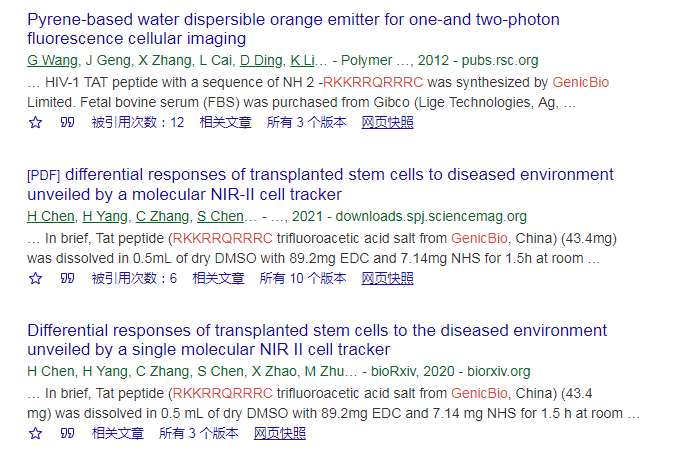
电话:021-3762 1270
传真:021-6762 1877
邮箱:service@genicbio.cn

HIV-1 TAT Protein (49-57) | RKKRRQRRR | 123251-89-8
| 货号 | 数量 | 价格(元) | 货期 | ||
 | GEB501801 | 10 mg | 询价 | 1~2天 | |
| GEB501802 | 50 mg | 询价 | 1~2天 | ||
| GEB301803 | 100 mg | 询价 | 1~2天 | ||
| 纯度: | >95% 或 >98% | ||||
| 序列: | RKKRRQRRR | ||||
| Arg-Lys-Lys-Arg-Arg-Gln-Arg-Arg-Arg | |||||
| CAS No.: | 123251-89-8 | ||||
| 分子式: | C53H106N30O11 | ||||
| 分子量: | 1339.62 g/mol | ||||
| 外观: | 白色粉末 | ||||
| 盐: | TFA盐 | ||||
| 储存条件(冻干粉): | -20°C(1年) 或 -80°C(1-2年) | ||||
| 运输条件: | 常温(加冰袋) | ||||
描述:
The TAT peptide (RKKRRQRRR), which isahighly positively-charged peptide with 9 residues derived from human immunodeficiency virus-1 (HIV-1) transcriptional activator protein (Tat),has been shown to have membrane penetration and nuclear localization properties, which are critical attributes of gene therapy agents.
TAT肽(RKKRRQRRR)是一种带9个残基的高正电荷肽,来源于人类免疫缺陷病毒-1(HIV-1)转录激活蛋白(TAT),RKKRRQRRR已被证明具有膜穿透和核定位特性,这是基因治疗剂的关键特性。
参考文献:
1, Ching-Hsuan Tung, Stephanie Mueller, Ralph Weissleder. Novel Branching Membrane Translocational Peptide as Gene Delivery Vector.
2, T Waku, Y Kitagawa, K Kawabata, S Nishigaki. Self-assembled β-sheet peptide nanofibers for efficient antigen delivery.
产品被文献引用:
1, M Gao, J Chen, G Lin, S Li, L Wang, A Qin, etc. Long-term tracking of the osteogenic differentiation of mouse BMSCs by aggregation-induced emission nanoparticles
2, K Li, D Ding, C Prashant, etc. Gadolinium‐Functionalized Aggregation‐Induced Emission Dots as Dual‐Modality Probes for Cancer Metastasis Study.
3, G Wang, J Geng, X Zhang, L Cai, D Ding, K Li, etc. Pyrene-based water dispersible orange emitter for one-and two-photon fluorescence cellular imaging.
4, H Chen, H Yang, C Zhang, S Chen, X Zhao, M Zhu, etc. Differential responses of transplanted stem cells to diseased environment unveiled by a molecular NIR-II cell tracker.
5, G Feng, CY Tay, QX Chui, R Liu, N Tomczak, J Liu, etc. Ultrabright organic dots with aggregation-induced emission characteristics for cell tracking.
6, K Li, Z Zhu, P Cai, R Liu, N Tomczak, D Ding, etc. Organic dots with aggregation-induced emission (AIE dots) characteristics for dual-color cell tracing.
7, P Zhang, X Nie, M Gao, etc. A highly selective fluorescent nanoprobe based on AIE and ESIPT for imaging hydrogen sulfide in live cells and zebrafish
8, X Cai, CJ Zhang, F Ting Wei Lim, SJ Chan, A Bandla, etc. Organic nanoparticles with aggregation‐induced emission for bone marrow stromal cell tracking in a rat PTI model
.........
学术截图





